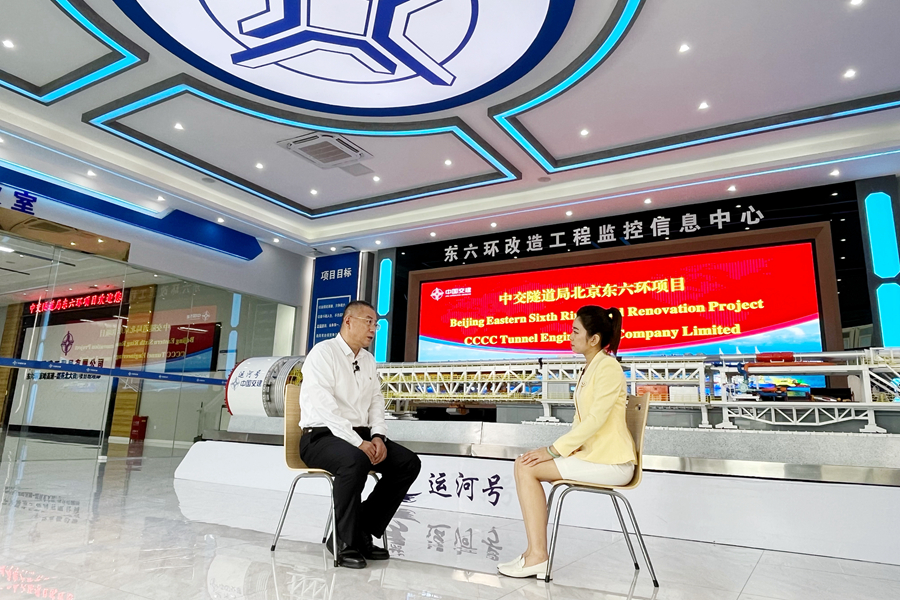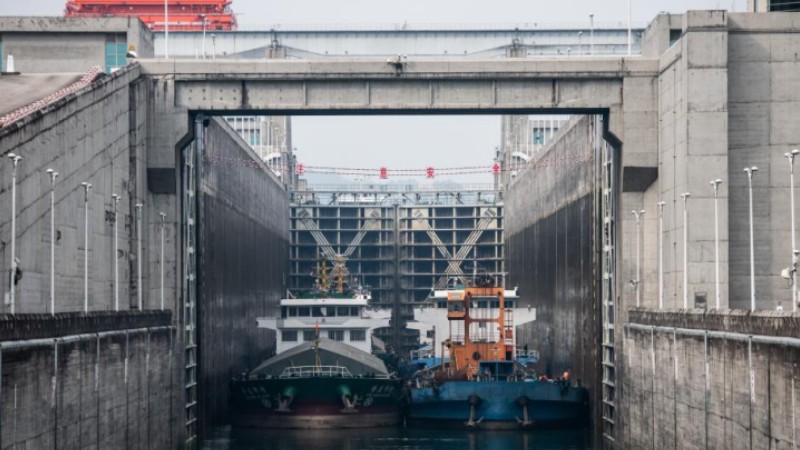China’s transportation sector pioneers green transition
The East Sixth Ring Road is a major transportation artery in Beijing, bustling with steady streams of cars every day. Beneath this road, workers are busy and China's largest tunnel boring machine is operating at full capacity to construct new underground sections of the East Sixth Ring Road.
Spanning 7.4 kilometers, the tunnel will be the longest highway shield tunnel in China. In the future, vehicles will travel through this tunnel, while the original segment of the East Sixth Ring Road will be transformed into green space and a "high line park," creating a pleasant area for local residents.

Chen Zhong, Deputy General Manager of CCCC, receives an exclusive interview with People's Daily Online. (People's Daily Online/Huangfu Wanli)
The tunnel project, undertaken by China Communications Construction Company Ltd. (CCCC), aims to expand urban space and enhance transportation services. Demonstrating significant ecological benefits, this project reflects CCCC's commitment to the green transition in the transportation sector.
An active contributor to green and low-carbon development
China has set ambitious "dual carbon" goals of reaching peak carbon emissions by 2030 and achieving carbon neutrality by 2060. The transportation sector, contributing roughly 10 percent of China's total carbon emissions, is a critical focus in the nation's efforts to reduce emissions. As a leader in this industry, CCCC has proactively undertaken its obligations.
Chen Zhong, Deputy General Manager of CCCC, told People’s Daily Online that the company is committed to promoting green manufacturing. For instance, in the Tianshan Shengli Tunnel Project on the Wuyu Expressway in Xinjiang Uygur Autonomous Region, CCCC has taken a series of measures, including energy-saving and carbon-reduction technologies in tunnel construction and steel processing. This included transitioning from coal to electricity in alpine areas. "The construction's carbon emissions have been cut by 200,000 tonnes, averaging a reduction of about 9 tonnes per linear meter of tunnel bored," Chen stated.
In its drive to develop green transportation service systems, CCCC is exploring ecological products. "We have designed and built the Shanghai Yangshan Port, Guangzhou Nansha Fully Automated Terminal Phase 4, Tianjin Port, and other green automated terminals. These have reached the world's highest level of full-process automation and intelligent container operation in ports," Chen said. He added that automated container terminals can reduce carbon emissions by about 9,000 tonnes annually compared to traditional terminals.
‘Development should be supported by science and technology’
Science and technology constitute a primary productive force. Committed to its development concept that “development should be supported by science and technology,” CCCC has been unswerving in pursuit of original innovation in areas such as plateau permafrost, offshore deepwater ports, and deep submerged tube tunnels.
CCCC continually enhances its research and development capabilities to create eco-friendly and efficient large-scale construction equipment. The use of the "Yi Hang Jin An 1" in the Shenzhen-Zhongshan Bridge project is a prime example. "It achieved an integrated construction approach combining 'function, management, structure, and power' for the first time in ultra-long-distance transport and installation of immersed tubes, cutting carbon emissions by about 220,000 tonnes in total and reducing the carbon rate by 40 percent," Chen elaborated.
Meanwhile, CCCC extensively implements intelligent management and operations throughout its design, production, and construction processes, aiming to upgrade China's smart transportation system. For instance, CCCC has utilized Building Information Modeling (BIM) in designing Ezhou Huahu Airport and developed a tailor-made digital management platform for the airport. Chen noted, "This approach has saved labor costs, significantly enhanced construction efficiency and quality, and substantially lowered carbon emissions."
Pioneering green infrastructure in BRI-participating countries
As one of the first central enterprises to expand globally, CCCC has actively supported the Belt and Road Initiative (BRI). The company has invested in and built over 3,000 high-standard infrastructure projects in BRI-participating countries.
Aligned with China's ambitious goal to establish a foundation for green development through BRI cooperation by 2030, CCCC aids participating countries in executing infrastructure projects focusing on environmental sustainability. The Riverside Green Development Project in Ethiopia, expected to significantly enhance the local living environment, received the ENR Global Best Projects Award in the Green Project category.
"We aim to foster cooperation with BRI participating countries and to advance the inclusive achievement of green development," Chen stated. As the global community confronts the escalating climate crisis, Chinese transportation companies, exemplified by CCCC, are actively working to optimize transportation structures and energy mixes, aligning them more closely with international green objectives.
(Guo Siqi, as an intern, also contributed to this article.)
Photos
Related Stories
- Deals worth over 58.8 bln yuan inked at int'l transportation expo
- Experts' views on green energy
- China's passenger trips surge in October
- China's road, waterway passenger volume soars in first three quarters
- Robust transportation, logistics data reflect China's economic vitality
- China's rural policy bank ups financial support for green projects
- China expects to see record-high expressway traffic during upcoming holiday
- Virtual power plants make energy use greener
- Yancheng in E China boosts green and low-carbon development
- Brazilian reporter explores China's low carbon practices
Copyright © 2023 People's Daily Online. All Rights Reserved.









